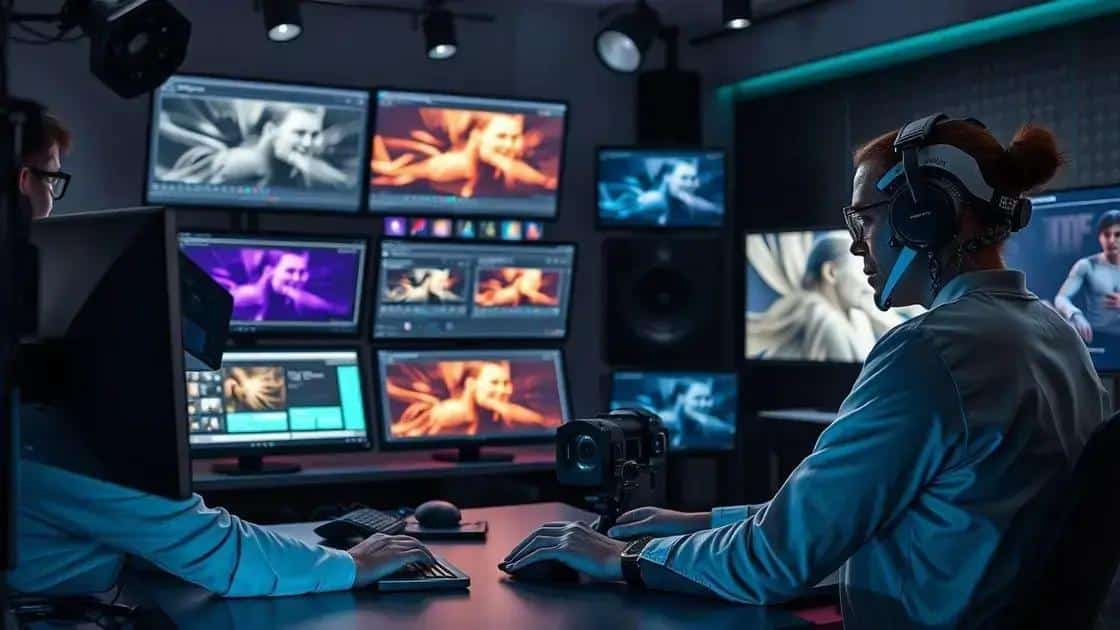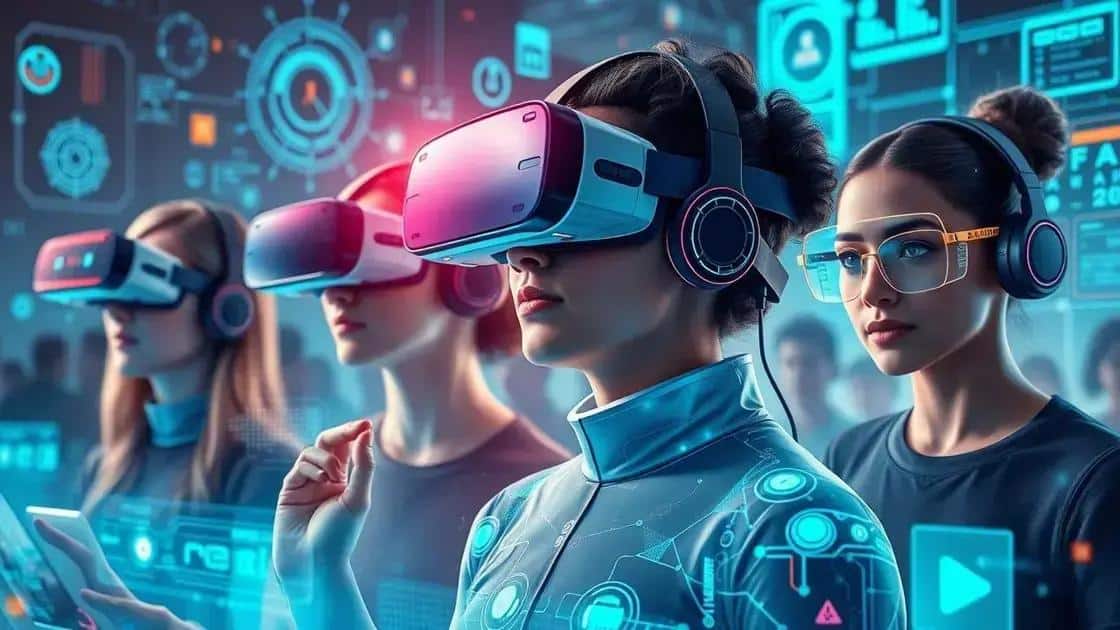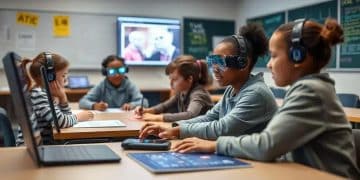AI-generated media trends shaping the future

AI-generated media trends are reshaping the creative landscape by enhancing efficiency, enabling personalization, and raising ethical considerations about ownership and bias, thus transforming how content is produced and consumed.
AI-generated media trends are transforming how we experience content in our daily lives. Have you noticed how much more dynamic your feeds have become? Let’s dive into these exciting changes.
Understanding AI-generated media
Understanding AI-generated media is crucial in today’s digital landscape. This type of media harnesses artificial intelligence to create content that can mimic human creativity. From art to music, AI has opened up new avenues for expression and engagement.
What is AI-generated Media?
AI-generated media refers to content created with the help of artificial intelligence algorithms. These algorithms analyze existing media, learn patterns, and produce new works that are often indistinguishable from human-created pieces. As technology evolves, so does the potential for AI-generated content.
Impact on Content Creation
The impact of AI-generated media is profound. Creators can produce content faster and at a lower cost. This shift allows for more experimentation and innovation in creative fields. In fact, many artists and producers are beginning to embrace AI as a tool rather than seeing it as a competitor.
- Increased creativity: AI can inspire new ideas.
- Cost efficiency: Reducing production costs.
- Accessibility: Making content creation easier for everyone.
Moreover, AI can analyze audience preferences, leading to more personalized content. By understanding what resonates with viewers, creators can tailor their media to meet specific demands. This capability transforms how we interact with content.
Challenges and Concerns
Despite the advantages, there are challenges to consider. For instance, ethical concerns arise regarding authorship and originality. If a piece of media is generated by AI, who owns it? Additionally, there’s the risk of over-saturation in certain genres, making it challenging for unique voices to be heard amidst the noise.
Another aspect to consider is the quality of content produced. While AI can generate materials quickly, the depth and emotional resonance of human-created media still hold significant value. Striking a balance between AI efficiency and human creativity will be essential moving forward.
Benefits of AI in media production

The benefits of AI in media production are becoming increasingly clear as technology advances. AI tools streamline the creative process, making it easier for professionals to focus on their vision. With AI’s ability to handle repetitive tasks, creators can spend more time innovating and expressing their ideas.
Improved Efficiency
One of the main benefits of AI is improved efficiency. By automating tasks such as video editing or audio mixing, AI reduces the time needed to produce high-quality content. This efficiency allows teams to meet tight deadlines while maintaining creativity.
- Faster content creation: AI can generate scripts and graphics quickly.
- Less manual work: Routine tasks can be automated.
- Optimized workflow: Improved collaboration between tools and teams.
Moreover, AI enhances collaboration among different departments in media production. Tools integrated with AI can provide real-time feedback and editing suggestions, promoting a seamless workflow. This connection helps teams to create without interruptions, leading to better outcomes.
Enhanced Creativity
AI also contributes to enhanced creativity. By analyzing trends and audience reactions, it aids creators in understanding what works best. This data-driven insight can inspire new ideas, helping artists and producers to push their creative boundaries. Collaborating with AI can spark creativity that individuals might not achieve alone.
Furthermore, AI systems can generate unique content styles. With these tools, creators can experiment with different formats and genres. This flexibility opens up opportunities for producing innovative media that resonates deeply with audiences.
Personalization and Targeting
Personalization is yet another significant advantage of AI in media production. AI can analyze user behavior and preferences, allowing content to be tailored to specific audiences. This ability to deliver personalized experiences can lead to higher engagement rates and a stronger connection with viewers.
Audience targeting becomes more precise, meaning that media products are not only seen but genuinely appreciated. By understanding what viewers want and how they interact with content, creators can enhance their offerings to better suit audience needs.
Challenges and ethical considerations
The challenges and ethical considerations surrounding AI-generated media are becoming increasingly important as technology evolves. As creators embrace AI tools, questions arise about ownership, originality, and the societal implications of these innovations. Addressing these issues is crucial for the responsible use of AI in media.
Ownership and Copyright
One major challenge is determining the ownership of AI-generated content. If a machine creates a piece of art or music, who can legally claim it? This ambiguity can lead to disputes between artists, programmers, and institutions. Copyright laws may need to be re-evaluated to adapt to AI’s role in the creative process.
- Confusion over authorship: Who is the true creator?
- Legal frameworks: Existing laws may not cover AI’s contributions.
- Potential lawsuits: Disputes could arise between parties claiming ownership.
Additionally, ethical considerations about original work surface. If an AI is trained using existing media, does it create truly original work? There’s a fine line between inspiration and replication, and understanding this distinction is vital.
Bias and Representation
Bias in AI algorithms presents another challenge. If AI systems are trained on biased data, they may produce content that reflects and perpetuates stereotypes. This outcome can impact how different groups are represented in media, leading to harmful effects on societal views.
To combat this, creators must be conscious of the data used to train their AI systems. Efforts should be made to ensure diverse and inclusive data sets, promoting equity and fairness in representation. By doing so, we can work towards a media landscape that values all voices.
Job Displacement Concerns
As AI takes on more roles in media production, concerns about job displacement arise. Many fear that automation could lead to reduced job opportunities for creatives. While AI can enhance workflows, it’s vital to find a balance that preserves human involvement in the creative process.
Rather than replacing artists, AI should be viewed as a tool that can enhance creativity. By collaborating with AI, professionals can focus on the aspects of creation that require human intuition and emotion, ensuring that the essence of storytelling remains intact.
Future predictions for AI in media

Future predictions for AI in media suggest significant shifts in how content is created and consumed. As technology enhances, we can expect new trends that will redefine the media landscape. Understanding these predictions is essential for creators and consumers alike.
Evolving Creativity
One prediction is that AI will evolve to assist creators even more intimately. As algorithms improve, they will provide sophisticated suggestions based on audience preferences and emerging trends. This development means that artists can push the boundaries of their creativity, with AI serving as a collaborative partner.
- AI could provide real-time feedback on creative projects.
- Algorithms may learn individual artists’ styles to enhance their work.
- New tools might emerge that allow for hybrid creations, blending human and AI input.
This collaboration will foster a new wave of creative expression, where the blend of human intuition and AI capability leads to innovative outcomes in media production.
Personalization and Engagement
Another significant change will be the heightened personalization of content. Future AI systems will be able to analyze user behavior more deeply, allowing platforms to deliver content tailored to individual preferences. This could lead to more engaging experiences for users and higher satisfaction rates.
The ability to create personalized media offers an advantage not only for consumers who seek relevant content but also for creators who aim to build more meaningful connections with their audiences. By focusing on user preferences, creators will enhance retention and engagement.
New Forms of Media
Looking ahead, we may also witness the emergence of entirely new forms of media driven by AI capabilities. Innovations like immersive storytelling using virtual reality or interactive narratives powered by AI could reshape how we experience stories. With advancements in AI, the boundaries of traditional media will expand.
For example, audiences might influence the direction of a story in real time, making the experience highly interactive and unique to each viewer. This shift can turn passive viewers into active participants, fundamentally changing how narratives are crafted.
Ethical Considerations
Despite the exciting possibilities, ethical challenges will remain. As AI-generated content becomes more prevalent, discussions around authenticity, copyright, and representation will become even more crucial. It will be essential for society to address these issues to ensure that AI practices remain aligned with ethical standards.
The balance between innovation and ethical responsibility will define the future of media shaped by AI. Thus, engaging in thoughtful discussions about these challenges will be vital for all stakeholders in the media landscape.
AI in media holds exciting possibilities but also presents challenges. As AI continues to evolve, it will enhance creativity and personalization while transforming how we interact with content. However, ethical considerations around ownership and bias must be addressed. Embracing AI’s potential means finding a balance between innovation and responsibility. Together, we can harness the power of AI to create a brighter media future.
FAQ – Frequently Asked Questions about AI in Media
How can AI enhance creativity in media production?
AI can provide real-time feedback and generate unique suggestions, allowing creators to explore new ideas and elevate their artistic expression.
What are the ethical concerns regarding AI-generated content?
Key concerns include issues of ownership, copyright, and potential biases in AI algorithms that could affect representation in media.
Will AI replace human jobs in media?
While AI will automate some tasks, it is meant to complement human creativity, not replace it. Collaboration between AI and humans can enhance the creative process.
How will personalization affect media consumption in the future?
Personalized content will cater to individual preferences, leading to more engaging experiences and stronger connections between creators and audiences.





